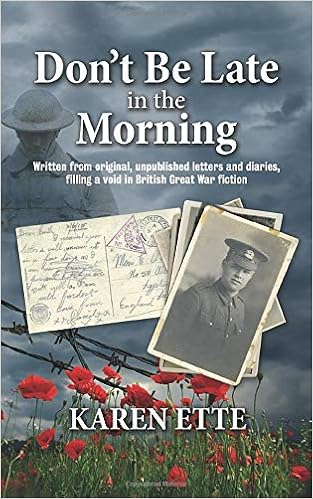As we are nearing Remembrance Day once again an excellent choice of reading would be Dr Karen Ette’s Don’t Be Late in the Morning, a vivid portrayal of a rural working class community before and during the First World War. The warmth and the hardships are evocatively conveyed through vivid domestic detail - paraffin lamps and outside ‘lavvies,’ smells of lavender polish and soot in the parlour ‘kept for best.’ There are also lesser known stories such as the personal and social cost of laudanum addiction fuelled by unscrupulous pharmacists.
When Emily’s mother dies she is forced, at eleven, to leave her four beloved brothers and live with her cruel, resentful aunt; at twelve she is old enough to leave school and go into service. As war breaks out and the recruiting drive swings into action the young men in the village join up with brothers, cousins, school mates, boys they played football with, and friends from the Sunday School. While the novel is set in Leicestershire, it was a familiar pattern all over the country.
David is accused by an army Major of being a ‘shirker’ because he is not in uniform, despite the fact he works in the boot and shoe industry, a reserved occupation. Leicester factories at that time were producing military footwear, including boots for the Russian army. Not wanting to be seen as a coward, he volunteers. When Emily agrees to become David’s fiancé before he leaves for the war, local gossips are scandalised. David Adcock and Emily Jane Wade are the author’s grandparents.
As she writes in the Afterword:
‘The novel ‘Don’t be Late in the Morning ‘is a work of fiction but it is founded upon a detailed reading of military history, official documents, and most significantly, unpublished primary sources, which reveal the human and personal cost of the conflict.’
Postcards, birthday cards, letters, diary entries and photographs are reproduced in the novel. The context of the war is conveyed through family debates around the kitchen table, newspaper articles discussed in the pub, and political meetings talked about after football matches. Ernest, Emily’s brother joins up because he is ‘sick of skiving leather... I’ll get regular meals, free uniform, no board to pay and a regular wage.’ That and the chance to travel was ‘everything I’ve always wanted.’ Those who volunteered were proud to see their names appear in the Roll of Honour printed each week in the Leicester Mercury. The pace of the novel increases with descriptions of Leicester ‘taken over by the military,’ with patriotic parades, marching bands, barracks life and square bashing, banter and camaraderie.
Girls and young women saw brothers, cousins, neighbours and sweethearts go to war. Some, like Emily’s colleague were left to cope with unwanted pregnancies. Emily now works in the Post Office and delivers mail; new opportunities meant she could leave service, as many young women did at that time. Middle class women bemoaned the lack of domestic servants.
Dr Ette is unsparing in her descriptions of the brutality of trench warfare. That the reader knows the names, faces and families of the young volunteers adds to the horror. She describes events on 13th October 1915, in what she calls the ’forgotten Battle,’ the Battle of Hohenzollern Redoubt. This action took place during the final stage of the Battle of Loos, a battle that does not receive the same coverage as later battles on the Somme and Third Ypres. On that one day over 500 young men were killed, many from the 1st/4th Battalion of the Leicester Regiment. Most were between the ages of 17 and 23. It was said that in some parts of Leicester there was such a density of casualties that distraught families could be heard grieving from house to house.
Obituaries from the Syston Parish Magazines are reproduced, often with photographs posed for so proudly at the outset of the war. ‘Captain of the Football club and one of the most regular boys in Mr Pain’s Bible Class,’ ‘...formerly a member of our Church Sunday School..., ‘Our sympathy goes forth to his widowed mother and relatives and we trust that the sense that the boy did his duty will be a consoling thought to them in their sorrow...’
The excellent bibliography gives an opportunity to learn more about events and individuals briefly referred to in the novel, for example Ramsay Macdonald, MP for Leicester and first leader of the Labour Party who opposed the war and ridiculed those who said it would be over by Christmas. His meetings in Leicester were disrupted by mob violence and on more than one occasion the police had to get him into a car before he was physically attacked. In August 1914 he wrote in the Leicester Daily Post. ‘Peace, if it is to be anything more than a patched up affair, is to raise anew some of the questions which have given Europe most trouble, as for instance the position of Poland.’
Other less well known stories include that of Kulbir Thapa, a Gurkha soldier awarded the Victoria Cross for rescuing a Leicestershire Regiment soldier from behind enemy lines, and then going back to save two men from his own battalion.
Another tantalising reference in the novel is to John Manners, son of the 8th Duke and Duchess of Rutland. His mother, Violet Manners, used her influence to obtain a fraudulent medical discharge for him before he saw any action with his regiment, the 4th Battalion Leicestershires. She did not want to lose the heir to Belvoir Castle. The full story was published in Catherine Bailey’s ‘The Secret Rooms,’ Viking 2012.
Sue Mackrell
5.0 out of 5 stars


